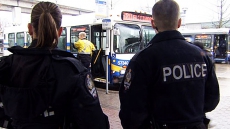VANCOUVER — British Columbia's south coast is known for its temperate weather and mild winters, but that norm is being turned on its head this year as temperatures dip and the region is blanketed in snow for the second time in less than a week.
Monday's flurries marked the first time a significant amount of snow fell on Metro Vancouver in more than two years, causing widespread traffic delays and prompting the closure of several schools.
Some more preliminary snowfall accumulation numbers for #VancouverIsland incl #Victoria #Nanaimo #PortHardy for this morning. #BCstorm pic.twitter.com/iIw94o5Ku2
— EC_BCweather (@ECCCWeatherBC) December 9, 2016
Earlier this week, Environment Canada anticipated a considerable amount of snow to hit the south coast starting Thursday evening, but the weather agency has since dialled back its forecast.
It changed its prediction to between five and 10 centimetres of snow for the Lower Mainland and between 10 and 15 centimetres for southern Vancouver Island.

"We're expecting a little less than originally anticipated because last night's snow didn't materialize until this morning," Matt MacDonald, a meteorologist with Environment Canada, said on Friday.
Lower-lying areas were expected to likely begin mixing with rain on Friday afternoon, he added.
Hello snow, we’ve been expecting you. #bcstorm #yvr #Vancouver #WestEnd pic.twitter.com/PdncWM0ciU
— Tom Who (@TommieWho) December 9, 2016
"Temperatures are right around freezing, which makes it difficult to forecast," MacDonald said.
Vancouver Island has so far received the brunt of the weather, with 12 centimetres of snow on the Malahat highway and the Cowichan Valley, and coastal communities experiencing between five and 10 centimetres.
The provincial government announced Thursday it may be forced to shut down two of the Lower Mainland's main bridges if workers were unable to prevent ice from forming on the structures' cables and falling on passing vehicles.
From 11am today. Stopped snowing on #PortMann and #AlexFraser. Haven't dropped PortMann collars yet. Still monitoring. #surreybc #coquitlam pic.twitter.com/BGwKI16p28
— BC Transportation (@TranBC) December 9, 2016
Monday saw dozens of vehicles damaged, leading to 80 insurance claims and prompting a pledge from the province to cover the deductible payments of those affected.

MacDonald said a weekend of snow and rain would lead into a period of uncharacteristically low temperatures as an Arctic air mass moves into the region, bringing with it temperatures up to 15 degrees lower than the yearly norm.
Some big flakes coming down in #vancouver right now. Be safe everyone and take your time. #bcstorm pic.twitter.com/r2MySMhKLF
— Jeremy Szafron (@JeremySzafron) December 9, 2016
Deep-freeze conditions will come to end in mid-January, when the weather is expected to return to the yearly normal, he added.





